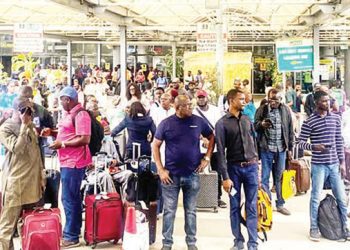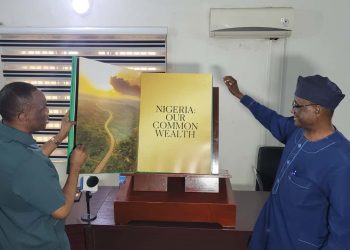The Nigerian Communications Commission (NCC) has again reiterated its drive towards increased broadband penetration in the country.
This was part of Professor Umar Danbatta, NCC executive vice chairman’s goodwill message at the two-day DigitalSENSE Forum Series 2016 held in Lagos during the week, adding that the Commission will not relent on creating enabling environment for competition among operators in the industry as well as ensuring the provision of qualitative and efficient telecommunications services throughout the country.
The EVC represented by Oluwatoyin Asaju, deputy director, Spectrum Admin at NCC, added that increased broadband penetration will lead to more organisations adopting Bring Your Own Device (BYOD) and other flexible approach to work environment.
According to the International Communications Union (ITU), an “increasing number of workers are relying on mobile devices to do their jobs, and smart companies and nations realize that this trend can help them cut costs and boost efficiency”.
To this end, the EVC said in a paper titled, “Internet governance: creating opportunities for all Nigerians: the role of broadband”, was in line with the Commission’s mission “support a market driven Communications industry and promote universal access”.
He said that the future broadband is nonnegotiable, as almost 3 billion people, estimated 40% of the world’s population, are using the internet and two third of the number are from the developing world.
“In developing countries, the number of Internet users will have doubled in 5 years, from 974 million in 2009 to 1.9 billion in 2014. Mobile broadband remains the fastest growing telecommunications market segment, with continuous double-digit growth rates in 2014.
“Mobile broadband is growing fastest in developing countries, where 2013/2014 growth rates were expected to be twice as high as in developed countries (26% compared with 11.5%), according to the ITU”.
All regions continue to show double-digit growth rates but Africa stands out with a growth rate of over 40% – twice as high as the global average.
Meanwhile, mobile-broadband subscription in Nigeria tripled from 30,939,112 subscriber in 2012 to 97,034,843 subscribers as Dec. 2015.
The EVC boosted that Nigeria has met ITU’S broadband target for 2015, especially by establishing a national broadband plan, in which the country sets major broadband target of 30% Broadband Penetration by 2018.
According to him, “This means we will see increase in GDP! More small business will contribute to GDP because, 10% increase in Broadband equals 1.3% increase in GDP!
“We have taken the right steps towards unleashing broadband like, Licensing of infrastructure companies; Auction of 2.6GHZ spectrum; Fiber connectivity of internet exchange points and Determination of whole sale pricing for lease capacity.
“Therefore, with over 107 percent teledensity for voice segment of telecommunications services already achieved in Nigeria, Nigeria remains a sure haven for ICT investments”.
The National Bureau of Statistics recently collaborated Professor Danbatta’s optimism by presenting Nigeria as “Nigeria has one of the largest and fastest growing telecoms market in Africa; Telecommunications constitutes a significant portion of the Nigerian economy. It contributes 8.88% to the nations economy. Telecommunication is the 5th most resilient sector in Nigeria”.
The EVC who commended DigitalSENSE Africa (DSA) Media for the Forum, said, specifically, that mobile broadband is the most dynamic market segment and stands at around 78 active subscriptions per 100 inhabitants in Europe and the Americas.
He added that Africa is the only region where mobile broadband penetration remains below 20%; thus, the Broadband market in Nigeria is huge and ripe as consumers are the major beneficiaries of Broadband availability and services.
“Other opportunities include: satellite services; bandwidth provision; clearing houses gateway services; education and training; consumer rights protection; information services; and opportunities in rural areas.
He however noted that the underlying concept of Universal Service is to ensure that telecommunications services are accessible to the widest number of people (and communities) at affordable Prices.
But, “In spite of the sector’s recorded successes, the industry experiences challenges. Some of these include: poor quality of service caused primarily by network capacity constraints; the lack of physical and transmission infrastructure; scarce spectrum resources; unreliable power supply; disparity in telecommunications facilities between urban and rural areas; shortage of long term investment capital; skill shortages; security challenges; theft; transmission cable cuts. These challenges are opportunities for growth and investment”.
Although the Commission’s strategies have proved successful in stimulating private sector investment and involvement, the Commission welcomes the views of the private sector on how to improve broadband services and more ways to attract additional private sector investment.
He noted that the Commission will continue to promote transparent regulation as an affirmation of the Nigerian telecommunications sector as a safe haven for investors.
He described the Nigerian market as has moved to a fully liberalized market where the law of jungle has been replaced by the law of competition.
“NCC has removed the barriers to market entry and now rely upon natural market forces and technology to ensure market sustainability.”
To this end, the EVC said “We are passionate about facilitating Broadband penetration through provision and optimization of access to and use of affordable fixed and mobile broadband in Nigeria. It will necessarily take time and effort, but at the NCC, we are confident that, from the records of achievement in the past 15years, the goal of 30% Broadband Penetration by 2018 will be achieved very soon. We will not relax until all Nigerian homes, offices, parks and citizens are connected online and until we meet and surpass all ITU standards for broadband penetration. We must include all and exclude none!












































